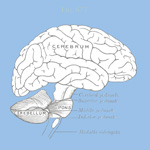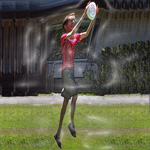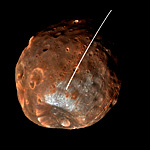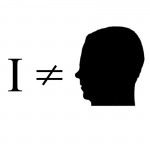“Coed” is a fictional exploration of fusion – two persons coming together to cohabit in a shared body. Fusion cases are more complex than fission, involving greater discontinuities, botb physical and psychological. You may find that contemplation of fusion cases fosters real doubt as to whether two persons are present, or one.
 She knows he’s in there – she can see him brokenly through the office door’s bevelled glass, framed and backlit by the window, inert in his chair. “It’s me, May,” she calls softly, not wanting to attract attention in the hallway.
She knows he’s in there – she can see him brokenly through the office door’s bevelled glass, framed and backlit by the window, inert in his chair. “It’s me, May,” she calls softly, not wanting to attract attention in the hallway.
The last thing Jerry wants now is to be bothered by students. With time suddenly so precious to him, he is not prepared to squander it on their all-too-protean intellects. The knob rattles, making him seethe. Typical of students nowadays; they’ll barge in anywhere. They hardly care which washrooms they use. Even May startled him at the urinal, once. They were both convulsed by giggles, meeting like that. He scolded her, but she didn’t care. Abruptly, it occurs to Jerry that it’s probably May now – she said she’d drop by this afternoon.
At last she sees the fragmented figure inside lurch to its feet, lean towards the door.
He was right – May stands there with her shining golden hair and the essay-in-progress which has been her excuse for visiting him during the entire term. Playfully, she kicks the door closed behind her.
Instead of reaching out to her, Jerry stands listlessly, his arms limp. She wonders what’s wrong.
He realizes he will lose this too. In six months – a year at most – she will avoid his gaze. Not only she, but all the other tantalizing female students. And even the ones that aren’t tantalizing. But now she is waiting for him, to say something. “How much have you written since last time?” His tone is collegial, only a little condescending.
“Nothing,” she admits without a trace of guilt. She dares him with her eyes to reprimand her, but her playful invitation is rebuffed.
That’s how he feels about her too – absolutely guiltless. It’s a wonderful relationship, even more so than his relationship with Carole, which he once thought wonderful enough to justify the unpleasantness and expense of a divorce. And now when he has achieved this, and so much else – when his life has at last taken a finished shape, with full-professor status, four-month European vacations, and a conscience mature enough to allow him the things he really wants – now, at age forty, it’s over. Continue reading “Coed – episode 1”







 We are not Cartesian egos. We are not biological organisms either.
We are not Cartesian egos. We are not biological organisms either.
 Imagine, in the early days of books, a small library consisting entirely of original manuscripts. Some of them are very old, and have been attacked by mice. Some have deteriorated so much that their pages crumble to dust when the custodian of the library tries to read them. He mourns the loss of these books, and contemplates the inevitable decay of the remaining books with sorrow. To be sure, new manuscripts are occasionally added to the library, but they cannot replace the volumes that are lost forever. This goes on until, one day, the young assistant librarian has an idea. “This book will be unreadable in five years,” he tells his elder. “But I can read it now. If I copy the words of this book onto sheets of new vellum, and bind them in a strong new binding, we will be able to read it for many decades to come.” The old librarian tenderly strokes the cracked spine of the crumbling volume, and shakes his head. “What good is a copy? It wouldn’t be the same book.”
Imagine, in the early days of books, a small library consisting entirely of original manuscripts. Some of them are very old, and have been attacked by mice. Some have deteriorated so much that their pages crumble to dust when the custodian of the library tries to read them. He mourns the loss of these books, and contemplates the inevitable decay of the remaining books with sorrow. To be sure, new manuscripts are occasionally added to the library, but they cannot replace the volumes that are lost forever. This goes on until, one day, the young assistant librarian has an idea. “This book will be unreadable in five years,” he tells his elder. “But I can read it now. If I copy the words of this book onto sheets of new vellum, and bind them in a strong new binding, we will be able to read it for many decades to come.” The old librarian tenderly strokes the cracked spine of the crumbling volume, and shakes his head. “What good is a copy? It wouldn’t be the same book.”